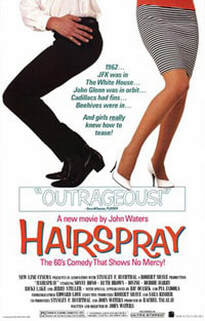 Many years ago, I went to a staged production of Hairspray. This show was based on a 1988 movie by John Waters about a bunch of teenagers living in the city of Baltimore in the 1960s. In the staged production that we saw, the performance would stop at certain times and the author of the original film, John Waters, would speak from a lectern and tell amusing anecdotes about the movie and its actors. In the movie, the dream of the teen characters is to dance in one of the coolest shows on television, a teenage dance show called The Corny Collins Show. Due to the times, the Corny Collins Show is a segregated show where only white teens can dance except for one day a month (Negro Day) when black teens participate. The star of the movie is Tracy Turnblad, played by actress Ricky Lake. Tracy and her friends, both black and white, spearhead an effort to desegregate the Corny Collins Show. At one point, John Waters informed us that the show featured in the movie was based on a real teenage dance show called the “Buddy Deane Show”, which ran from 1957 to 1964. This show was also segregated and only allowed black dancers every other Friday. With the Civil Rights movement at its apex, the pressure to desegregate the Buddy Deane Show mounted, but the home station that ran the show was unwilling to integrate the black and white dancers, so it just cancelled it. At this point, John Waters interjected, “But who needs reality?” In his movie, Tracy and her friends succeed in integrating the Corny Collins show, and all the bigots get their comeuppance. Many years later, this is the moment of that function that I remember best. John Waters saying, “But who needs reality”. Being a scientist, I should, in principle, wince at that statement. After all, scientists are in the business of discovering reality. And we know how important reality is for human beings to live a life grounded in facts and evidence free of the shackles of ignorance and superstition. However, the truth is more complicated. The are millions of human beings in this world living in societies mired in disease, poverty, disenfranchisement, exploitation, discrimination, repression, and violence. For many of these people, the hope that their condition will improve anytime soon, when viewed from any objective point of view, is nothing but a fantasy. Yet, in these societies, individuals ranging from poets, writers, painters, and filmmakers, to political and social leaders or just regular folks, articulate and visualize fantasies that their trials will end one day, and that that their wrongs will be made right. Thus, fantasy can actually play a constructive role in our lives. Fantasy allows us to imagine a better future where good prevails over evil, and we overcome the intractable problems that burden us, to be free in that happily ever after ending, where the just are rewarded, and the wicked are punished. From fairy tales to movies such as Hairspray, fantasy can be a powerful motivator for change and a source of strength and inspiration that moves us to dream, hope, and act. But fantasy can also be a destructive force, and we all had the opportunity to witness this on January 6th of 2021 when a mob of people stormed the U.S. Capitol Building to stop the counting the electoral college votes of the American people, to harm our elected representatives, and to overturn a fair and free election. These people had been told the lie that the election was stolen, and they believed it to the extent that they were willing to risk their livelihood, their freedom, and their lives to contravene the will of the majority of their fellow Americans. I want to clarify here that I am not making a political point. All the evidence we have indicates that the 2020 election was not stolen. This is an objective description of reality. Arguing otherwise is unreasonable. Now we come to the crux of my argument, which I am presenting here as my opinion. Most fantasies have at their core grievances that are real. But what is the grievance that spawned the fantasy that led to the denial of the election results and fueled January 6th? The people involved in these activities had been told for years that there is a cabal of nefarious entities such as the elites, the deep state, the fake news media, liberal Marxists, environmentalists, atheists, LGBT people, and others who hate them and their way of life. And these entities allegedly seek to control or destroy them by several means including manipulating the laws, the schools, the elections, the government, and other things. This is the bogus grievance which has spawned the fantasy among these people that they are under attack, and thus they need to strike back and defeat those who threaten them before it is too late. And after they do so, they will usher in a new era in our republic where their way of life will be safe once again and the bad people will be punished. When this fantasy is accepted, facts, evidence, and reason become irrelevant, and trust in our institutions and their safeguards against abuse of power become non-existent. This is how a fair and free election became a “fraud” where their votes were cancelled and their candidate was denied his rightful victory. This is how a call to a protest, where they were told that if they didn’t fight like hell and show strength they wouldn’t have a country anymore, was interpreted as a directive to attack the very heart of our democracy while they risked life and limb in doing so. This is the frightening power of fantasy. When it arises out of the noblest desires of humanity for a better future, it can be a formidable constructive force, but when it arises out of fear and ignorance fed by lies and misinformation, it can become a formidable force of destruction. The United States Capitol attack collage by Aca1291 is used here under an Attribution-ShareAlike 4.0 International license. The Hairspray movie poster is used here under the doctrine of Fair Use.
0 Comments
3/29/2023 2020 Election Redux: My Opinion is as Valid as Yours! When Do We Declare Someone to Be Unreasonable?Read Now I have debated many conspiracy theorists on Twitter. In the majority of the cases the arguments they put forth are a mishmash of innuendo, hearsay, selective quoting of the evidence, exaggeration, misinformation, and ignorance. After some back and forth where I rebut their claims with evidence and facts, we reach a point where these individuals argue that in the end, it’s my opinion against theirs, and that I have my trusted sources and they have theirs. The implication is, of course, that both are equivalent. But when it comes to certain issues, nothing could be further from the truth. Take for example the notion that the 2020 election was fraudulent, and that Mr. Trump really won by a landslide. Although this may seem like a political issue that I should not be discussing in a science blog, I have already explained that the questions “Who won the election?” and “Was the election fraudulent?” are both scientific questions because they can be answered with evidence. Thus, in my exchanges with 2020 election conspiracists I present the facts: Out of 64 cases that Trump and his allies brought to federal courts, he lost 63. Conspiracists claim that most of these cases were dismissed on technical or procedural grounds without considering the merits of the cases, but this is not true. Only 20 of these cases were dismissed before hearing the merits, whereas 30 cases were dismissed after considering the merits of the case, and 14 were withdrawn by Trump and his backers before the hearing of the merits. In several of the cases the courts, which also included Trump-appointed judges, issued stinging rebukes of the unsupported claims of election fraud. A group of prominent conservatives has systematically reviewed the claims brought about by the Trump campaign and their allies in each of these lawsuits and found them to be unsupported by the evidence.
The Department of Justice led by Trump’s Attorney General, William Barr, found no evidence of election fraud. Neither did the Cybersecurity and Infrastructure Security Agency (CISA) of the Department of Homeland Security and other government agencies. Multiple audits and recounts of the results in swing states affirmed that Mr. Trump lost. A Michigan Republican state senator, Ed McBroom, led an 8 month investigation into the legitimacy of the Michigan election and found no evidence of fraud. A GOP-backed review of the Arizona election found that indeed Biden had won. Official examination of voter fraud claims in Georgia did not reveal any fraud of a magnitude to overturn the election. The Trump campaign employed a research firm to review voting data from six swing states, but the firm did not find anything that would have overturned the result of the 2020 election. Trump was told he lost by some of his inner circle of advisers, but he ignored them. There were no major problems with drop boxes for mailed ballots. The expansion of postal voting did not lead to widespread fraud. Mail-in-ballots are secure and widely used in the United States even before the 2020 election. There is no evidence that Biden received more than 8 million excess votes in the 2020 election. A scientific study analyzed statistical claims of alleged systematic voter fraud in the 2020 election, and found them to be unconvincing. The movie “2000 Mules” which posits that people aligned with Democrats were paid to illegally collect and drop ballot boxes in several swing states has been conclusively debunked. The type of affidavits claiming voter fraud presented by Trump and his allies to the courts were mostly hearsay, guesses, speculation, or ignorance of election procedures, and could not be taken as proof of voter fraud. Trump’s lawyer, Rudy Giuliani, has been suspended from practicing law in New York for making false claims about the 2020 election. Another Trump layer, Jenna Ellis, was censured in Colorado for making false claims about the 2020 election. Trump’s lawyer, Sidney Powell, who is being sued by a voting machine company, Dominion, for claiming that the company stole the election from Trump, is arguing that “No Reasonable Person’ Would Believe Her Dominion Conspiracy Theories Were ‘Statements of Fact’.” The Dominion lawsuit has also uncovered that the talking heads and executives of the Fox News channel did not believe the election fraud claims of Trump and his allies, but nevertheless they kept giving them airtime to avoid losing viewers. Thus, all the people who relied on Fox News as a trusted information outlet for commentary on the election fraud issue were willfully deceived by individuals who did not believe that what they were communicating to them was true. But there is still a majority of Republicans who think that the election was stolen and that there is solid evidence for it. So far the evidence indicating that there was no fraud in the 2020 election of a scale that would alter its outcome is truly formidable. Nevertheless, election conspiracy advocates dismiss the investigations carried out by election officials, elected representatives, watchdog groups, the media, and government agencies as biased or indecisive, and they dismiss the court case results as not being based on merits. They also label any Republicans involved (many of whom voted for Trump) “RINOS” (Republicans In Name Only), while claiming that others are not to be trusted because they are part of the “Deep State”, part of the “fake news” media, etc. There is a criterion to decide whether someone is acting reasonably or not. This involves asking them, “What evidence would change your mind?” If the person cannot answer this question and commit to changing their mind if the evidence is produced, then we can assume that this person is being unreasonable. The opinion of an unreasonable person is not equivalent to that of a reasonable one, and this is not a trivial point. When unreasonable persons act and/or sway others to act based on falsehoods, this can lead to dire consequences such as the storming of the Capitol on January 6th 2021 by a mob enraged over an election that was never stolen. Being reasonable matters. Image by El Sun from Pixabay is free to use for commercial and non-commercial purposes. 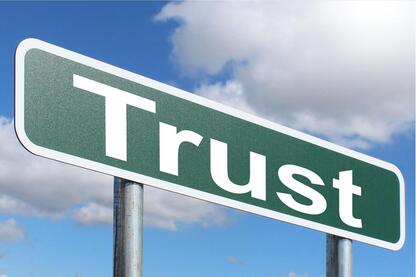 Every now and them when I have the patience, I take a deep breath and visit pseudoscientific websites. These websites are laden with misconceptions, misinformation, and lies that tend to make my blood boil, but it is important to try to read what these people are arguing so you can counter it effectively. Recently I was reading a creationist website, Answers in Genesis, when I happened upon an article regarding whether we really landed on the moon. The article goes over the skepticism that some people, including Christians, have expressed about whether we really landed on the moon. The author of the article stated that he could rebut point by point the arguments made by the moon landing skeptics, but since that has already been done, he pursues what he calls a “much more straightforward approach”. The author of the article mentions that two of the twelve men who landed on the moon are now born-again Christians, and that they wrote books about their experience as astronauts. Thus, to doubt the moon landing is tantamount to accusing two fellow Christians of lying. And because the standard in the Bible to establish the truth of certain issues requires two or three witnesses, the testimony from these two reliable Christians should be enough to allow other Christians to accept that the moon landing is true. Reading this I chuckled. Of the 12 men who landed on the moon, there were 10 non-born-again Christians that would have told you exactly the same thing that the two born-again Christians would have told you. However, because these ten men were not in this religious category, their testimony is presumably not as trustworthy as that from the two born-again ones. Although the author acknowledges that there is other evidence and arguments that could be brought to bear on the issue, he considers this the most straightforward approach. People should accept this is true because those who they should trust claim it is true. As it turns out, this method of settling the truth is in fact very ancient. People may not understand the arguments regarding an issue, and they may not have confidence in the evidence, but they will believe those who they trust. And those who they trust have been traditionally those who they know and those with whom they share the same values. In fact, this phenomenon is so well recognized that when governments or organizations wish to disseminate a message of public importance, they often contact respected members of the target community who are willing to transmit the message. For example, Dr. Fauci has outlined a government strategy to increase vaccination levels that involves recruiting “trusted messengers” in communities across the country to explain why it is important to get vaccinated. Finding these trusted messengers is as important as the message itself. Most of the time these trusted messengers belong to the circle of family, friends, or those who are known in the community (preacher, police officer, etc.). People may also trust total strangers as long as they are convinced that the strangers share the same beliefs and values as they do. From antiquity, this propensity to trust those who you know and those who share your beliefs and values has created bubbles that have insulated groups of people from outside influences, so much so that throughout history a lot of time and effort has been spent by people or groups of people figuring out how break past these bubbles to earn the allegiance of others. The advent of mass media has made it possible for individuals and groups to penetrate these bubbles and reach people at the very heart of their communities, and this process has accelerated with the advent of the internet and has had a cascading effect. Nowadays total strangers can reach with ease people they have never met and deliver to them messages to earn their trust which they then pass to others. Sometimes this is a positive development as, for example, when people are convinced that vaccination is important. However, individuals who do not provide people with factual information can also gain their trust. One example of this was the fraud claims of the 2020 election. The 2020 election will go down in history as one of the most scrutinized and contested elections. The large amount of court cases, recounts, audits, and other investigations that were, and are still being conducted is breathtaking, not only for the sheer numbers, but also for the fact that no evidence of significant election fraud has been uncovered. But what was even more remarkable is what happened to Republicans who had been trusted members of their communities and parties, and then acknowledged the reality that there is no evidence of significant fraud. For example, Georgia’s top election official, Brad Raffensperger, called Georgia’s election for Biden and reaffirmed that after two recounts and an audit. Raffensperger is a pro-life Republican who has never voted for a Democrat, and who twice voted for Trump. Nevertheless, he received death threats to himself and to his family and had to go into hiding for a week. The death threats kept coming even months after the election. Instead of supporting him, the Republican party of Georgia censured Raffensperger, and it looks like Republicans will not support him for reelection. Another example is, Ed McBroom, a state senator for Michigan who headed an exhaustive 8-month investigation into the legitimacy of the Michigan election. McBroom, a fourth-generation farmer and a pro-life Republican who is music director of his church, reviewed claim after claim, found no evidence of fraud, and issued his report. Almost overnight, people who had known him for years, supported him, and believed him to be honest, ceased to trust him. McBroom also received a barrage of emails, texts, and phone calls insulting him and threatening him. The above has also happened to many other Republican officials ranging from election operatives to governors who declared they did not find any significant fraud in the results of the election. It seems that the ancient bubble that protected people from outside influences has been busted forever. People now regularly anoint as trusted messengers individuals from outside their immediate communities whom they don’t know and have never met. And this happens to the detriment of the trust they would otherwise normally place in family, friends, acquaintances, or those whom they know for sure to share their beliefs and values. This power in the right hands can be used to do good, but in the wrong hands it can be used to isolate people from reality and manipulate them. Such is the unsettling power of the trusted messenger. Trust sign by Nick Youngson from Picserver.Org is used here with no modification under an Attribution-ShareAlike 3.0 Unported (CC BY-SA 3.0) license. 4/30/2021 The Monsters Produced by the Sleep of Reason and Their Effects on the Dynamics of RealityRead Now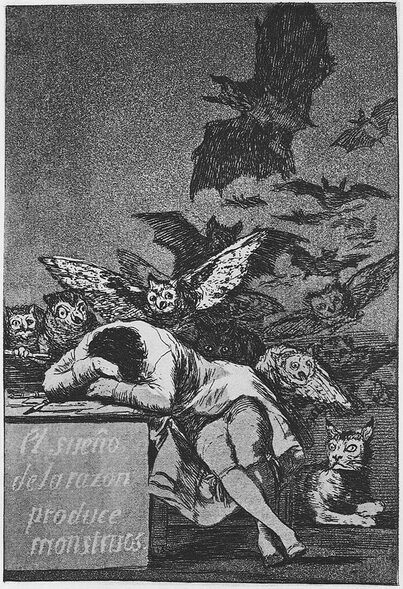 The Sleep of Reason Produces Monsters The Sleep of Reason Produces Monsters In 1799, the Spanish painter Francisco Goya published a compilation of 80 aquatinted etchings (the Caprichos series) in which he criticized the irrationality and ignorance rampant in the Spanish society of his time. The most famous of these etchings depicts a writer asleep at his desk surrounded by bats, owls, and other creatures swarming about him that in Spanish folklore were associated with the mysterious and evil. The title of the etching, written on the desk of the writer, is “the sleep of reason produces monsters”. I am writing this post in the year 2021 in the United States, and although a gulf of 222 years and more than 3,000 miles separate me from the Spain of Goya, it is my opinion that Goya’s thinking is very relevant to our society today. In the past few years, we have all witnessed with growing frequency how reason has slumbered in the minds of millions foisting a number of monsters upon our society. We have seen firsthand how disinformation and misinformation have spread like cancers capturing the imagination and wills of people and spawning things like disdain for journalists and scientists, COVID-19 severity denial, and vaccine hesitancy. We have experienced an unprecedented level of polarization in our society to the point that those seeking a middle ground are attacked and ridiculed. We have seen how millions have insulated themselves from ideas and opinions that go against their beliefs, preferring instead to listen to those that tell them what they want to hear. We have seen the rise of philosophies, narratives, and frameworks of knowledge that run contrary to reality, ranging from isolated unfounded conspiracy theories to warped world views like QAnon.
One example of a particularly dangerous monster is the skepticism regarding the 2020 election. Many Americans have been fed misinformation that this election was a fraud, and many Americans have believed it despite the fact that no evidence has been uncovered that indicates this is the case. And perhaps one of the most memorable portrayals of the mindset of the fraud believers was revealed in Jan 4, 2021 during the Fox Business Network program “Lou Dobbs Tonight” by its host Lou Dobbs who had been a frequent broadcaster of conspiracy theories. Dobbs was interviewing the director of a pro-Trump Political Action Committee (PAC), and he said the following: We’re eight weeks from the election, and we still don’t have verifiable, tangible support for the crimes that everyone knows were committed, that is, defrauding other citizens who voted with fraudulent votes. We know that’s the case in Nevada, we know it’s the case in Pennsylvania and a number of other states, but we have had a devil of a time finding actual proof. Why? Many eyes opened wide, and jaws dropped that day. Here it was, revealed in all its brutal matter of fact casualness for all the world to see: the sleep of reason. Although Dobbs to his credit, and unlike many fraud believers, did admit that there is no evidence for the fraud claims, he then goes on to state that everyone KNOWS that such fraud happened, and wonders why it is so hard to find the evidence. The disconnection is glaring! We normally base our knowledge that something has happened on evidence, therefore lack of evidence cannot support such knowledge. Reasonable people would accept that knowledge that is unsupported by evidence is not trustworthy and, in fact, is not knowledge at all – reasonable people. Only two days later Americans came face to face with the monster spawned by this irrationality when a mob of Trump loyalists stormed the Capitol seeking to overturn the results of the election and to harm or kill our elected representatives. While many dismiss the storming of the Capitol as the actions of a few, there are millions of people that still believe that there was fraud in the elections. And while most of these people don’t sanction the extreme behavior exhibited by the criminals who stormed the Capitol, these people can vote and request that their elected representatives act on their will. At the time Goya made his famous etchings, the system of government in Spain and many other countries was a monarchy. In such a system the average citizen has little influence on the actions of their government and how it affects them. However, the United States is a democracy. In this system, the people elect their leaders and can pressure them into taking certain actions. This is the strength of democracy, but it can also be its weakness if a significant number of people who are not acquainted with reality elect and pressure their representatives into supporting fictions. The current modifications to election practices that are being enacted in several states are an example of this. It is not my intention to issue an opinion on the merits of these modifications, but I just want to point out that these modifications are being implemented mostly in response to skepticism about the validity of the 2020 election. However, because based on the evidence this skepticism is unwarranted, it follows that the enactment of these modifications is unwarranted too. Rather than being proud of the fair and transparent 2020 elections with a historic turnout, a significant part of our population views them with suspicion or is convinced that fraud took place and that something must be done about it. And this, of course, can affect the dynamics of reality. If a substantial number of people elects and pressures their leaders to uphold a fiction, this fiction in terms of its consequences paradoxically will turn into a de facto reality that will affect others. It is important to counter misinformation and fight for the wills of those who have accepted it or who are considering accepting it. It is important to awake reason and vanish the monsters that its slumber has begotten. Goya understood the danger of the sleep of reason more than 200 years ago, and we must also understand it today, and with more urgency because in a democracy the people have the power to alter the dynamics of reality. And we cannot allow reality to be compromised. The etching by Goya is in the public domain.  Although I don’t normally deal with politics in my blog, I do deal with conspiracy theories and how scientists determine the truth. In that sense I have written posts about the 2020 election addressing both the election conspiracy and the methodology employed to investigate fraud in the election. In this post I want to address the issue regarding the nature, significance, and validity of affidavits presented by the Trump campaign as evidence of fraud. One of the often repeated claims in the 2020 election was that Mr. Trump’s lawyers had hundreds of affidavits that indicated the existence of widespread voter fraud. An affidavit is a sworn written testimony by an individual that states that what the individual is telling is the truth. An affidavit is made under penalty of perjury, which means that if it is determined that the individual lied in their testimony they can be exposed to legal consequences. Many people take this to mean that Mr. Trump had strong evidence that voter fraud took place. After all, these witnesses were willing to sign these documents and face the consequences if their testimonies were shown to be false. However, this is not how an affidavit works. An affidavit merely certifies that a person considers that their assessment of reality is true. An affidavit does not rule out the possibility that the particular perception of reality that the person describes is wrong; it merely states that they consider it to be true. And you cannot prosecute people for believing honestly that something false is true. You have to demonstrate that there was intent to deceive, and in the majority of cases this is very difficult to prove. So the “sworn and signed under penalty of perjury” argument for the validity of affidavits is an exaggeration.
But, what about the claims that were made in these documents? It is not my intention to go over these claims in detail, as others have already done that. A proper affidavit should just stick to the facts and avoid opinions, hearsay, describing the views of others, and unfounded beliefs. Unfortunately, most of the claims behind the affidavits provided by Mr. Trump’s lawyers were assertions or beliefs that some things had happened, combined with conjectures about possible sinister motives behind these things. Other claims were merely things such as mean looks or rude remarks people had made at claimants, or suspicious things they had seen or heard. The majority of these claims were the product of hearsay, guesses, and speculations combined with ignorance by the claimants of the vote counting process or the voting dynamics. The claims in these affidavits did not hold up under scrutiny and they were dismissed by judges (several of them selected by Mr. Trump) as inadmissible or not credible. However, I want to point out a much broader issue regarding affidavits. Science has long known that people who are looking for something will tend to find it, even if there is nothing to be found. This is encapsulated in the dictum: “expectation influences perception.” Scientists also know that when an individual is exposed to a certain stimulus, this can influence the individual’s response to a subsequent stimulus. This is a process called “priming”. If, for example, you release the news that a mountain lion is loose in the city (even if this is not true), you deliver a primary stimulus that creates an expectation. If you then provide a telephone number to call in case somebody sights the animal, that phone will be ringing all day. When people thus primed are exposed to the normal stimuli that they encounter day to day as they go about their business, a significant number of them will reinterpret these stimuli to indicate that they have seen the mountain lion. Based on the foregoing, it is noteworthy that Mr. Trump repeatedly raised the possibility of voter fraud in the months leading up to the election and mentioned it regularly during the process of counting of the votes and afterwards. In view of his extensive social media presence at the time, this could have had a large priming effect on his supporters that raised expectations about voter fraud, and could have led them to interpret any glitches in the system, clerical errors, interactions with other poll workers and observers, and even routine election procedures that they were not familiar with, in the worst possible light. If you are primed to find fraud, especially if the person you voted for lost or is is losing, you will find it. It is partly because of the above that in this case affidavits alone are not reliable evidence. There has to be additional supporting evidence of good quality that buttresses what the affidavits allege is true. In the case of the 2020 election court cases that were dismissed on their merits, the courts considered that no such evidence was provided to them. Image by Nick Youngson from Picpedia is used here under an Attribution-ShareAlike 3.0 Unported (CC BY-SA 3.0) license. 1/23/2021 Election 2020 – In the Absence of Safeguards, How Do We Distinguish Fantasy From Reality? A Scientist’s PerspectiveRead Now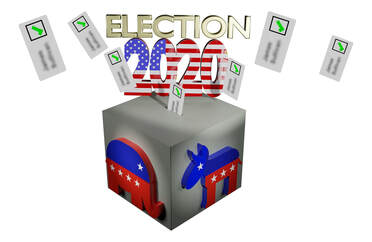 Elections are normally not considered a scientific topic. However, when elections take place many scientific questions can be formulated about their outcome. For example, “Which candidate obtained the majority of the votes in a given state or in the overall election?” is a scientific question, as it can be answered by counting the votes. Additionally, and more relevantly to the 2020 election, questions about the integrity of the election can also be formulated as scientific questions. However, and this is the key, BEFORE you ask questions and begin searching for evidence that fraud has taken place, you have to define what would constitute “fraud” (as opposed to mere machine glitches or human error), how said fraud would be detected and investigated, and how much fraud has to be present to label the election as “compromised”. Only then can meaningful questions be asked, evidence procured, and valid conclusions reached. Why is this? Scientists have known from decades of research into the human mind that people with a strong interest in finding evidence for something will find it even if the evidence is not there. Human psychology is such that even people whose intent is honest will filter reality and find patterns where there are none to be found. This is a process akin to finding shapes in the clouds. Defining a priori what constitutes fraud, what should be considered valid evidence for fraud, and how much of it would have to be present to declare the election to have been compromised is an elemental level of protection against human bias. As far as I can tell, Mr. Trump and his team did not do this. Rather they seem to have cast as wide a net as possible which risks ending up with a trove of false positives.
Another level of protection against bias is to recognize that the people best suited to assess whether there is fraud in the election are not those who WANT to find it. This is a very elemental concept in science which has led to the introduction of many controls in the research process. One possible way to control this source of bias is to rely on evaluations of the evidence and the election conducted by people who don’t share your biases, or at least by people committed to place doing their job and following the law above everything else. If enough of these people look at any evidence of fraud presented to them, or assess the procedures followed in the elections and still reach the conclusion that the election was not compromised, then that is an indication that this was indeed the case. Based on the foregoing, agencies such as the Department of Justice and the Cybersecurity and Infrastructure Security Agency, along with several dozen courts and fact checkers, plus multiple election officials, state attorney generals, and governors (many of them pro-Trump Republicans) have not found convincing evidence of foreign or domestic interference in the election, or of fraud at a level that would overturn the results of the election. These assessments mentioned above involving many individuals of different political persuasions as well as different courts and agencies should have given Mr. Trump confidence that the election results were fair. Instead, Mr. Trump and his team disqualified these assessments, claiming that the people involved at best were indifferent or incompetent, or at worst had nefarious ulterior motives, and may have even coordinated with each other forming part of a massive conspiracy also involving foreign actors. Over the past few years, I have exchanged many arguments with what I call irrational skeptics. These are people that defend various conspiracy theories ranging from global warming, 911, and COVID-19 severity deniers to antivaccination advocates, creationists, and chemtrail and flat Earth proponents. All these people share the common trait that they are immune to evidence against their ideas, and that any attempt to discredit their ideas will be considered further proof of the existence of a conspiracy. In this sense, I do not see any difference between these irrational skeptics and Mr. Trump and those that support his election fraud claims. Of course, I am not naïve. I know full well that there may be political and other types of motivations behind the claims of the Trump campaign that have nothing to do with a desire to find the truth. But the intention of this post is not to speculate about motivations. My goal is just to address the elections from a scientific perspective. And in that vein, I want to propose a thought experiment. I want you to consider what would have happened if Mr. Biden had contested the results of some of the states he lost employing exactly the same methods and arguments used by Mr. Trump and his team. Suppose that Mr. Biden had selected a team of “colorful” lawyers to find voter fraud. Mr. Biden’s team could have pointed to the fact that Biden was ahead in early voting in some states such as North Carolina but that later this trend reversed, as an indication that something ”strange” happened. They could have gathered affidavits from people that thought they had witnessed something suspicious or irregular going on. They could have interpreted every glitch in the system or any clerical error in the worst possible light. They could have interpreted videos of election workers going about their jobs to suggest irregularities and edited portions of the videos in suggestive ways to make their case. They could have relied on testimonials of selected “experts” that exaggerated their credentials. They could have put forward statistical analyses of voting data based on questionable assumptions. They could have alleged that their observers were not allowed enough access to the vote counting process. They could have even named their lawsuit the “Medusa” lawsuit (Kraken/Medusa - get it?). My question then is: If Mr. Biden and his lawyers had searched for evidence of voter fraud in some of the states he lost employing these sloppy or questionable procedures, would they have “found” evidence of voter fraud of a magnitude and nature similar to that found by Mr. Trump’s lawyers in other states? The point of this exercise is to consider whether, in the absence of safeguards against human bias, the normal impressions people derive from their assessment of reality, coupled to the glitches and mistakes present in any election, can be spun to construct a narrative of fraud. I will leave it up to you to answer this question. But if your answer is “Yes”, then it should be obvious that unless rigorous and well-defined procedures are employed to analyze the integrity of a process such as elections, it is impossible to distinguish fantasy from reality. Scientists know this to be true for science which is why they use these procedures. Assuming there is an honest interest in finding the truth, why can’t we accept the same procedures are necessary for evaluating the integrity of elections? And if we accept this is the case, why can’t we accept that any investigation that was carried out without following these procedures is not trustworthy and its premises are questionable? Election 2020 image by conolan from Pixabay is in the public domain. 1/16/2021 The Election Conspiracy: The Dire Consequences of Living in an Alternate Reality and What We Can Do About ItRead NowAs I have discussed before, our brains seem to be wired to filter and process our perception of reality based on expectations that we have about the nature of said reality. This may actually be beneficial as it serves as a mechanism to reduce the vast complexity of the world around us to a basic set of actionable premises that guide our response to life-changing events or forces that we don’t control or even sometimes understand. Of course, the problem with this approach is that we may not see or accept those things that don’t fit our expectations and we end up creating and living in an alternate reality. But what happens when this alternate reality collides with the actual reality? You would expect people to change their minds, right? Unfortunately this is not often the case. I have previously mentioned several specific reasons why people create and believe in conspiracy theories ranging from feeling safe, reducing uncertainty, and gaining control over their environment to developing and maintaining a positive image of one’s self or group. But I think one general reason why people create and accept conspiracy theories is to explain the discrepancy between their world view and reality. Nowadays there are millions of people in the United States living in alternate realities and accepting and spreading conspiracy theories to explain away the evidence that indicates their world view is wrong. Thus, flat Earthers claim that the evidence the Earth is round is fake and part of a conspiracy to hide the truth. Antivaxxers claim that pharmaceutical companies are hiding the evidence that vaccines are not safe and cause autism and other diseases. Global warming denialists claim that scientists and the organizations that fund them are faking the evidence for global warming. Creationists deny evolution and claim that atheists aligned with powerful secular interests are attacking religion. Chemtrail proponents allege the government is spraying us with dangerous chemicals. 911 deniers claim the government was responsible for the collapse of the World Trade Center buildings. COVID-19 severity deniers claim that liberals and left leaning organizations colluding with the scientific and medical establishment are exaggerating the impact of COVID-19 and trying to control people using lockdowns, masks, and social distancing. The latest addition to this list is the individuals that advocate the “election conspiracy”. These are individuals who have the false belief the election was stolen from President Trump by a vast group of republican and democratic election officials, governors, congressmen, and judges colluding with voting machine corporations, the “deep state” and foreign nations. I do not include this group of conspiracy believers here lightly. Although normally I don’t address political issues in my blog, the evidence that the election president Trump lost was not a fraud, as a he claims, is just too overwhelming to ignore or dismiss as a mere “opinion”. Dozens of election officials both Republicans and Democrats, along with recounts, audits, and courts, as well as assessments by fact checkers and government agencies did not find instances of fraud large enough to overturn the election. Belief in conspiracy theories has consequences at the level of the individual and society, and I think the severity of these consequences depends on two variables. One is the nature and scope of the conspiracy theory being embraced. Flat Earth proponents may only get laughed at, while antivaxxers may influence some people to not vaccinate their children who may then catch a serious disease. COVID-19 denialists may lead people to forgo masks and other mitigation measures that may put them and their loved ones at risk of being infected, while global warming denial activists may hinder urgently needed action on climate change. The other variable that may determine the severity of the consequences of embracing a conspiracy theory is the level of militancy it inspires and the extent to which its followers may become radicalized and willing to act on the premises of the conspiracy to the detriment of their own lives and wellbeing. The poster children for this last variable are the advocates of the “election conspiracy”. 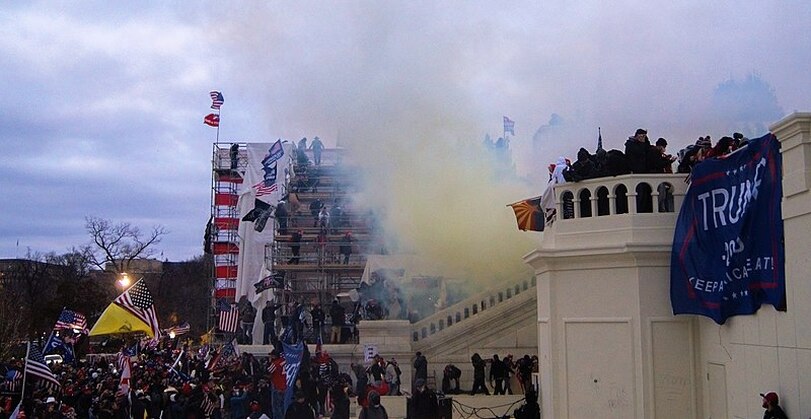 Tear gas being used on rioters n4ear the Capitol Tear gas being used on rioters n4ear the Capitol On January 6th the whole nation watched in shock as a mob stormed the US Capitol building while the electoral votes of the American people were being counted. The individuals that did this were so certain that the system had failed them that they were willing to risk everything for their actions. Now many of them have been identified and arrested. They are losing their jobs and businesses, and are being placed on no-fly lists and subjected to non-stop harassment and threats. One of them was shot, and three others died from medical emergencies suffered during the riot. Their actions, besides destruction of government property and damage to American democracy, led to the death of one Capitol police officer and the injuring and abuse of dozens of others. We shudder at the thought of what would have happened if this mob of individuals had been able to get hold of the members of congress inside the Capitol. It has been documented that several people in the mob were shouting “hang Mike Pence” (the vice president) as well as threats to others. The election conspiracy is a clear example of the dire consequences of living in an alternate reality immunized from facts and evidence. In this state of mind, people’s emotions and fears can be inflamed and manipulated to advance political or social goals in a process akin to selling them snake oil. And the people most susceptible to be victims of snake oil salesmen are those living in these alternate realities. So how do we deal with this? Whereas the more radicalized conspiracy believers may be too far gone to be helped, there is a larger mass of people that is unsure about accepting the conspiracy. Some aspects of the conspiracy make sense to them but they are turned off by other aspects. These people are not conspiracy theory believers, but they are conspiracy theory agnostics. I think that these conspiracy agnostics are the people we should talk with. We should address their concerns seriously with evidence and within a framework of respect for their views. But we also need to find what I call “converts” among the ranks of the conspiracy theory believers. Converts are people that have come to their senses having analyzed what they said and did and rejected the conspiracy. These are people that the conspiracy theory agnostics (and even some believers) can identify with. These converts should become the spokespersons against the conspiracy. We may not be able to eliminate the conspiracy, but maybe we can reduce its spread. The photograph by of tear gas being used on rioters outside the capitol by Tyler Merbler is used here under an Attribution 2.0 Generic (CC BY 2.0) license. |
Details
Categories
All
Archives
June 2024
|
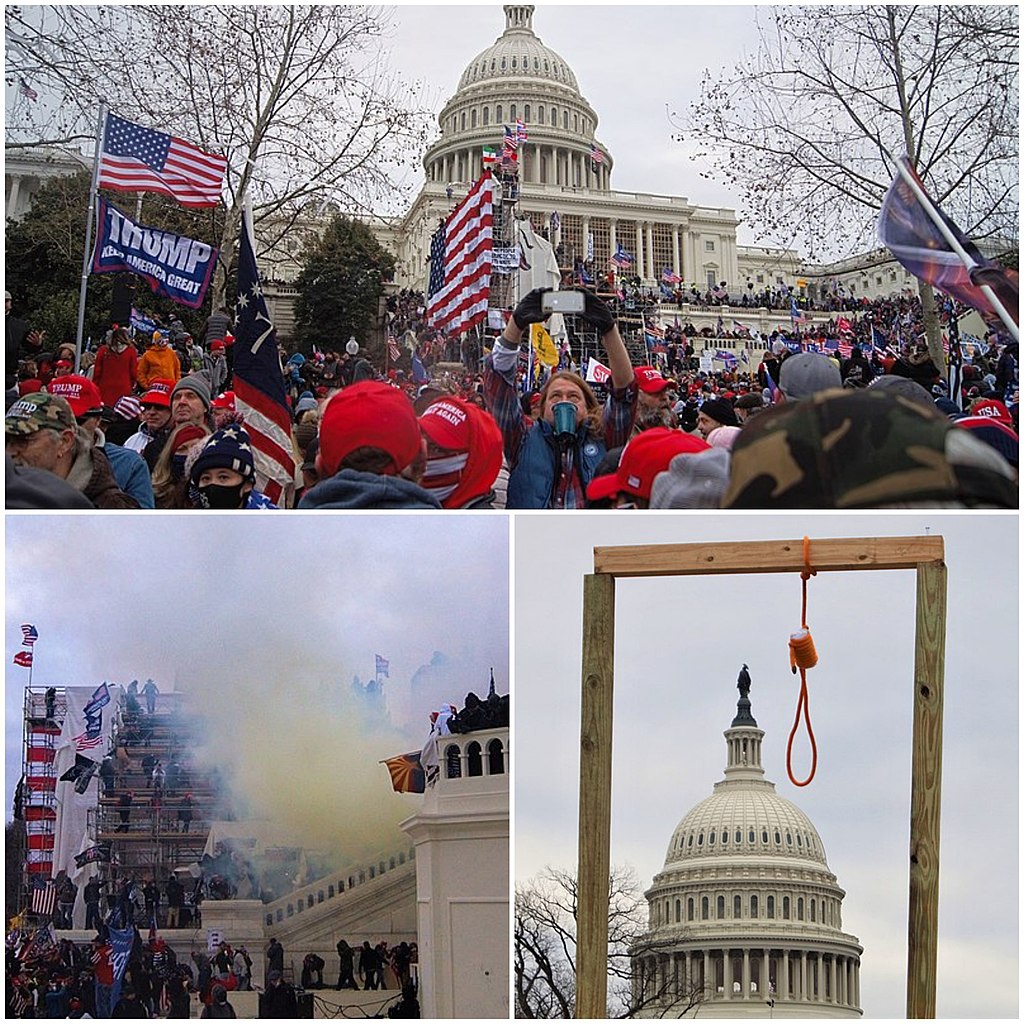
 RSS Feed
RSS Feed